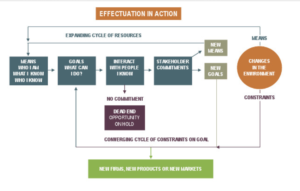This post is a continuation of the previous one.
It’s about my journey from a stable university job to becoming a freelancer. And the Effectuation strategy describes it really well. Not surprising as Effectuation (by Prof. Saras Saravathy) describes what entrepreneurs actually do. So I was already practicing Effectuation without realising it!
I hope my story can further help you by illustrating the Effectuation process and how it works.
I have already illustrated Step 1 (Means) using myself as an example in the last post.
Now, I will use my experiences and examples to illustrate the rest of the Effectuation cycle. Specifically I will use an example how things did not work out as hoped (and you need to prepare for that to happen quite a few times) and an example of how things did work out!

When Things Didn’t Work Out
My wife works in the financial services industry.
I remember in the early stages of her career (this was just before internet, and the smartphone era) she used something called the “tickler system” to manage and service clients. It looked like this!

Actually, my wife had two such boxes…one box organised her client data by name, and a second box where the client cards were organised by birthdate!
Birthdates are important in her strategy to service and to perform an annual review for her clients’ financial needs and situation.
(I know…I can sense how flabbergasted some of you are if you have been born in the age of the smartphone!)
Guess what, one day I was helping her carry those 2 boxes and I dropped them! The cards just scattered all over the ground. You should have seen the look of horror on my face! (And my wife’s too!)
This is a problem.
Then there was another problem.
Every time she does an annual review for her client, my wife needs to spend a few hours manually collating data to summarize it into a report to show her clients. That was a lot of hours!
So beginning with what I know (IT and database design skills, and the problems I just described), whom I know (my wife) I decided to write a software for her to solve those problems.
This is Step 2 of the Effectuation Cycle – Goals. The question is here is What Can I Do? The goal in this case was to write a piece of software to manage her client data and to automate, where possible, the creation of financial reports. I already had a desktop computer and the relevant software.
So apart from my time (it took nearly a year working on it part time and weekends), there was not much upfront cost involved. I was also observing the Affordable Loss principle.
And it worked! It saved my wife so much time and energy so she could focus more on her strengths – servicing and advising her clients. As she had more time, she interacted with more people (Step 3). And quite a few of them become her clients as a result (Step 4: Getting commitments). Her business grew!
And as her business grew, so did her resources (Back to Step 1). So I suggested another idea. What about purchasing a laptop? Then she need not waste time travelling back to the office. It was pretty expensive to get one of those then. And hardly anyone used one. But with a laptop, you can show the client’s financial situation without having to print out a paper report. This was Step 2. Her business grew some more she had more time for other things.
Then I got another idea – maybe we could also sell this software to other people like herself. She liked the idea and showed the software to her professional colleagues (Step 3). Some of them liked it. But they were thinking even bigger. Why just think about using this software on a laptop? Why not create an internet portal! Because you see, we were now on the cusp on the internet boom. They committed to working with me (Step 4). And there was funding available! (Back to Step 1).
So the next goal (Step 2) was to create an internet portal that will provide client management support for financial services professionals. I took a year long leave with no pay from the university to do this.
Well, all that came crashing down with the bust of the dotcom bubble.

But I learnt a couple of things from that experience. I did not really enjoying writing software for a living. I was not passionate about it.
Also it is a competitive field. I prefer to find something I could do that others could not. I want to differentiate myself so as to have little or no competition. This idea of a niche is important although not mentioned explicitly in the Effectuation cycle. Therefore, the question in Step 2 should be changed to “What Can I Do That Others Cannot?”
I prefer to find something I could do that others could not. I want to differentiate myself so as to have little or no competition. This idea of a niche is important although not mentioned explicitly in the Effectuation cycle. Therefore, the question in Step 2 should be changed to “What Can I Do That Others Cannot?”
This brings me to my other example-where things worked out!
When Things Did Work Out
While studying Management and Information Technology at MIT, I did not just pick up IT skills but also learned about an area few people understood at the time – Systems Thinking. Relax, you don’t have to know what that is to appreciate my story here.
The problem was that the literature on the subject tends to be either too complicated or did not provide useful guidance on application or both! And not many people knew about it let alone were applying it.
I was of the opinion that this was a powerful tool to help decision makers and policy makers in the thinking process. I could bring these ideas back to my home country when I graduate.
Some of my friends cautioned me not to waste time learning this subject because hardly anyone in my home country was talking about it or using it.
So was this an opportunity or a waste of time? I decided it was the former.
Upon graduation and returning to a university in my home country, I created a course on Systems Thinking and started teaching it. This was extremely do-able (Step 2). I also taught other courses on IT.
Many of the students in my MBA class were working professionals and by interacting with them, I learned about the challenges they faced at work and how Systems Thinking can or cannot be applied to help them. I was learning how to make Systems Thinking practical in the workplace. And guess what, I discovered a passion for that!
I also asked myself who else do I know that may find this useful? It turns out I knew someone who might. So I offered some consulting services to him for a token fee if he was interested. He was.
In the process of working with him, I was introduced to other people who just happened to be looking for someone with knowledge in Systems Thinking. Not surprisingly, it was quite difficult to find someone in my country who had deep knowledge in the area. And I was asked to do a half-day workshop on what Systems Thinking is! Interactions lead to commitments!
So my next goal was to design a half-day workshop for professionals with an emphasis on helping them understand and apply Systems Thinking to their work. And the university allowed faculty members a certain number of days each year to do this kind of work.
The workshop was success as participants appreciated that I had made a complex subject easy to understand and helped them to see the application possibilities. Over time, I began to discover that I can make a complex subject easy to understand.
But a half-day workshop was too short. There were still questions that needed answers but I could not cover that material in a half-day workshop. So then I offered a 2 day workshop – followed by an even more advanced 2 day workshop.
Once my workshops gained enough traction and customers, I left the university to pursue this freelance career full time.
Since then, I have been running these workshops successfully for almost 15 years while continuing to adapt it to the practical issues of the day.
Now corporate training, like software writing, can be a very competitive field. But not many people can effectively deliver workshops on Systems Thinking. Not a lot of people can understand this relatively complicated subject. Furthermore, not many people can make it easy to understand and practical. This is my niche and my competitive advantage.
I answered the question “What Can I Do That Others Cannot?”
And along my journey, I met someone who complemented my strengths and we worked together to design and deliver a year long programme on Change Management for executives and leaders. This programme has also been very successful and we are now (as of this writing) into our 12th annual run.
Conclusion
The Effectuation method of innovation and entrepreneurship resonates with me because it really describes the process I went through.
I did not realise that until I learnt of Sara Sarasvathy’s work on Effectuation.
Now that I am familiar with the work, I believe that it is a process that all freelancers, and would-be freelancers, should be aware of and should apply to their business.
But even if you are not a freelancer but an executive in a corporation, the Effectuation method is a good method to deal with unpredictable environments and to cultivate a culture of innovation.
Also in a time of disappearing corporate jobs, along with the rise of the freelance economy, mastering this strategy can be a big asset.

